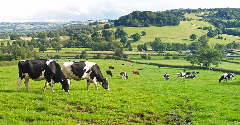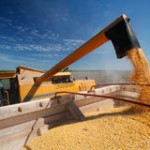News
FAO: 2014 cereal production will be all-time record
15 Dec 2014Latest indications confirm that world cereal production will reach an all-time record of more than 2.5 billion tonnes in 2014, according to the FAO. Buoyed by bumper crops in Europe and a record maize output in the United States of America, this year’s cereal output should reach 2.532 billion tonnes, including rice in milled terms, or 0.3% higher […]

Latest indications confirm that world cereal production will reach an all-time record of more than 2.5 billion tonnes in 2014, according to the FAO.
Buoyed by bumper crops in Europe and a record maize output in the United States of America, this year’s cereal output should reach 2.532 billion tonnes, including rice in milled terms, or 0.3% higher than 2013, according to FAO’s latest Crop Prospects and Food Situation Report.
The record global cereal harvest in 2014 will outpace projected world cereal utilization in 2014/15, allowing stocks to rise to their highest level since 2000 and pushing the worldwide stock-to-use ratio, a proxy measure for supply conditions, to rise to 25.2%, its highest level in 13 years, according to FAO.
However, the report also warns that food insecurity is worsening in a number of countries due to civil conflicts, adverse weather and the Ebola virus disease (EVD) outbreak. Some 38 countries are at risk of food insecurity, including 29 in Africa, 3 more countries than reported in October.
EVD triggered one of the biggest shocks to West Africa’s agriculture and food sectors, as it started to spread when crops were being planted and expanded throughout the farming cycle, especially in Guinea, Liberia and Sierra Leone. FAO warned that local rice prices and those for cassava, the region’s second staple food, showed notable increases in Freetown and other cities in September.
Adverse weather in the Sahel region is also expected to result in a sharply reduced harvest – by as much as 38% below average in Senegal.
Conflict seriously impacts on food insecurity
The situation in Syria is particularly urgent, as a weak harvest is exacerbating strains due to worsening civil conflict. An estimated 6.8 million people – some refugees in neighbouring countries – are facing severe food insecurity. FAO reports a notable production decline for the 2014 crop, due to abandoned land, scarce labour, damaged power stations and canals as well as drought conditions.
The situation in Iraq is also acutely serious, where the number of people displaced due to civil conflict has tripled since last year to 2.8 million.
One third of the population is in need of urgent food assistance in the Central African Republic (CAR), where this year’s food crop production is estimated to be 58% below average despite improving on 2013, FAO said. It noted an increase in violence since early October in a country where one in four households has resorted to negative coping strategies, including selling productive assets and slaughtering livestock.
Prices of agricultural commodities shot up as much as 70% this year in the CAR. According to FAO, the decline in cereal output was partially mitigated by a large 45% jump in the production of cassava, which though less nutritious is less reliant on labour and other inputs.
Refugee movements – especially from Sudan’s Darfur region, northern Nigeria, the CAR and Mali – have put pressure on local food supplies, notably in Chad, where more than 550,000 people need food and livelihood assistance, according to the report.
While the recent harvest and delivery of humanitarian aid has offered relief, more than 6 million people in South Sudan, Sudan and Somalia are deemed to be in need of food and livelihood assistance. Prices in those countries remain at high levels, with sorghum prices running as much as four times higher in some of the most conflict-affected areas, further deteriorating vulnerable people’s access to food.
Maize supplies stable in Southern and Eastern Africa
Elsewhere in Africa conditions were better, especially in Southern Africa, where stable maize prices declined due to ample supplies from this year’s bumper output boosted food security. More stable maize supplies also led to a 78% drop in the number of food-insecure persons in Zimbabwe.
Recent harvests and favourable prospects for the second season crops helped push maize prices down in some countries of East Africa.
Meanwhile, 2014 cereal crop production was slightly below average in North Africa, where Morocco suffered sharp reductions due to erratic rains while the output in Tunisia recovered after a poor 2013 harvest.
Dry conditions result in reduced Central American harvest
Mexico is enjoying a bumper maize crop and its cereal output is expected to increase by 7% above last year’s record harvest, FAO said.
That may ease the production short-fall expected in Central America, where a drought earlier in the year pushed the maize output down by around 9%, resulting in 400,000 families in Honduras, El Salvador and Guatemala needing food assistance.
Aggregate cereal output from Europe this year is estimated to be 5.6% higher than 2013, while the U.S.’s record maize output comes despite less acreage being sowed
Related news

Has ‘clean’ had its day?
22 Dec 2025
Wielding clean-label positioning and fortification as marketing levers is a dangerous strategy, and brands would be better off explaining the hows and whys of the ingredients in their products, say experts.
Read more
Celebrating the winners of the Fi Europe Innovation Awards 2025
3 Dec 2025
Food industry stakeholders celebrated as the winners of the Fi Europe Innovation Awards were announced at a ceremony in Paris.
Read more
Alternative protein startups pivot to B2B ingredients amid funding shift
27 Nov 2025
Alt protein startups are pivoting from consumer meat analogues to high-value B2B ingredients, driven by stronger investor interest, better margins, and clearer commercial pathways.
Read more
Walmart Marketplace’s record growth prompts search for UK sellers
26 Sep 2025
Walmart’s third-party e-commerce platform, Marketplace, has witnessed extraordinary growth – but a need for more product diversity has prompted the retailer to recruit UK sellers.
Read more
The winners of Vitafoods Europe Startup Challenge 2025 revealed
29 May 2025
Four startups – Yomio Drops, PFx Biotech, Revobiom, and Favamole – took top prizes at this year’s Vitafoods Europe Startup Challenge awards.
Read more
East takes on West in the fight for future food flavours
30 Apr 2025
Asian and South American flavours are now key components on global menus, driven by a growing global appetite for culinary mashups.
Read more
Food companies urged to bring ‘joy’ and urgency to healthy food mission
14 Mar 2025
For too long, businesses have treated health and sustainability as separate agendas – but there is growing evidence to show diets that benefit human health can also enhance that of the planet, say experts.
Read more
Entries open for inaugural Vitafoods Europe Innovation Awards
29 Jan 2025
Entries are open for the inaugural Vitafoods Europe Innovation Awards, celebrating the ingredients, finished products, partnerships, and initiatives redefining the nutraceutical landscape.
Read more
Paris Olympics: Food and beverage brands champion health, fun, and sustainability
5 Aug 2024
Food and beverage brands are aligning with the Paris Olympics 2024 Food Vision, which emphasises sustainability, local sourcing, and plant-based diets.
Read more
Natural Remedies: Bringing health and happiness via validated branded ingredients
18 Apr 2024
Natural Remedies is an internationally renowned botanical healthcare company committed to advancing the field through rigorous research and the development of clinically validated Branded Ingredients. Guided by our foundational principle of ‘BEING USEF...
Read more
